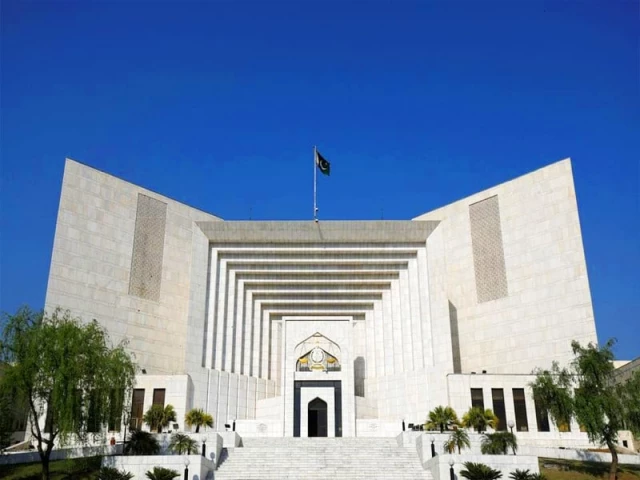ISLAMABAD:
The Supreme Court acquitted a 74-year-old Christian in a blasphemy case after 23 years of imprisonment, most of which he spent in a death cell due to his mental disorders.
“The petitioner is above seventy-four years of age and has spent about twenty-three years in prison, most of which was in the death cell. The opinion of the medical board raises a doubt as to the guilt of the petitioner and the benefit thereof cannot be withheld in the facts and circumstances of the present case. The benefit of doubt is therefore extended in favor of the petitioner and, accordingly, he is acquitted of the charge against him.
The judgments of the High Court and the trial court dated 30.06.2014 and 18.07.2002 respectively are set aside. In case the appellant is not required to be incarcerated for any other matter, he will be immediately released. We hope that the Executive Director of PIMH will ensure that the medical treatment of the appellant is not interrupted,” said a nine-page judgment written by Justice Athar Minallah while hearing a blasphemy case pending before the apex court since 2014.
Justice Irfan Sadaat Khan and Justice Malik Shahzad Ahmad Khan were also part of the bench hearing this case.
It is learned that the case has been settled in several courts more than a dozen times since 2017, but could not be resolved.
As per the facts of the case, following a complaint filed by Inspector Nasrullah Khan Niazi, SHO Gawalmandi Police Station, Lahore, the case was registered for commission of the alleged offense under Section 295-C of the Pakistan Penal Code, 1868 on September 28, 2001.
The complaint concerned a letter dated August 27, 2001, addressed to Haji Mehmood Zafar. The entire letter was reproduced in the crime report.
The appellant was arrested in September 2001 and after the investigation was completed, a report under Section 173 of the Code of Criminal Procedure, 1898 was submitted to the competent court. The appellant pleaded guilty to the charge against him on June 28, 2002.
In his statement recorded under Section 342 of the Criminal Procedure Code, the appellant, Anwar Kenneth, admitted to writing the letter dated August 27, 2001.
After the trial, the trial court convicted the appellant of the alleged offense under Section 295-C of the Penal Code and sentenced him to death. He was also ordered to pay a fine of Rs500,000 which, in case of default, was to be recovered as arrears of land revenue.
The High Court responded to the reference in the affirmative; therefore, the death sentence was upheld and the appeal was dismissed on June 30, 2014. Three years later, the Supreme Court heard his prison petition and granted leave on December 15, 2017.
The offending letter was sent to the Council of Islamic Ideology (CII) in December last year. The CII submitted an interim report on September 13, 2024.
After examining the case, the Punjab Institute of Mental Health (PIMH), Lahore, was directed to constitute a medical board and submit a report after assessing the appellant.
The doctor of the Central Jail, Lahore, in a letter dated January 1, 2025 addressed to the Inspector General of Prisons, Punjab, informed that the appellant was examined by specialist doctors at PIMH and was diagnosed with bipolar affective disorder, which was in the hypomanic stage.
The medical board recommended that the applicant be admitted to PIMH for treatment. He was admitted on December 31, 2024.
On February 11, the court ordered the PIMH executive director to constitute a medical commission in light of the principles laid down by the court in the Safia Bano case.
The commission was duly constituted and after careful consideration its findings were submitted to the Supreme Court on May 30.
The commission concluded that the convict suffered from bipolar affective disorder and recommended his admission to the Punjab Institute of Mental Health (PIMH) for treatment.
The judgment notes that the opinion of the medical commission, composed of eight specialist doctors in the field of psychiatry, confirmed that the applicant suffered from a serious mental disorder and that it was first diagnosed during his examination in December 2024. The opinion also confirmed that the content of the letter reflected the typical symptoms of the diagnosed mental disorder, the judgment states.
The court noted that the contents of the letter clearly indicated that its author suffered from mental disorders.
“The appellant’s behavior during the investigation and trial was not that of a normal, sane person. The contents of the letter reflected signs of grandiosity, hallucinations and delusional flights of ideas. Although the abnormality was evident from the conduct and contents of the letter, neither the prosecution nor the trial court had the appellant medically examined by specialists in the field of psychiatry”, indicates the judgment.




